(First published in 2010)
The Trailblazers: Sheena Iyengar & Jasmin Sethi…
[dropcap]I[/dropcap]magine blindfolding yourself and trying to do your daily chores in a dark world. Now imagine blindfolding yourself and managing to get a perfect SAT score, going on to Harvard and Stanford to get an MA, JD and a Ph D, becoming a lawyer in a topnotch law firm, a business professor in an Ivy League school, traveling all over the world, becoming an accomplished researcher and writing a critically acclaimed book.
All while blindfolded.
Impossible, you say? Well, between the two of them, Sheena and Jasmin Sethi have accomplished all this in spite of their blindness. Both of the sisters suffer from Retinitis pigmentosa, an inherited disease, but have not let that stop them from creating vibrant, successful lives and conquering the sighted world.
I first met them two decades ago when as a journalist I learned about Jasmin Sethi who at 17 had achieved 1600, the perfect SAT score. When I called her for an interview, her mother Kuldeep impulsively invited me to a birthday party being held for Jasmin in their Elmwood Park, NJ apartment. And that’s how I became an insider in a surprising, brave new world.
Clutching a gift-wrapped bottle of perfume, I met Jasmin, slight and pretty with a radiant smile. As I mingled with their family and friends, ate the inevitable samosas and cake and took photos, I met Sheena, her older sister, beautiful in a dark green sari, with both dressed for the occasion. They laughed and talked with guests, and for me it was hard to believe that for them there was this formidable barrier of darkness, as they stood on the cusp of adulthood and the big, complicated world which lay beyond the walls of their secure, modest home
I had often wondered what their future would be like and over the years had called a few times to talk to their mother.
Fast forward 15 years.
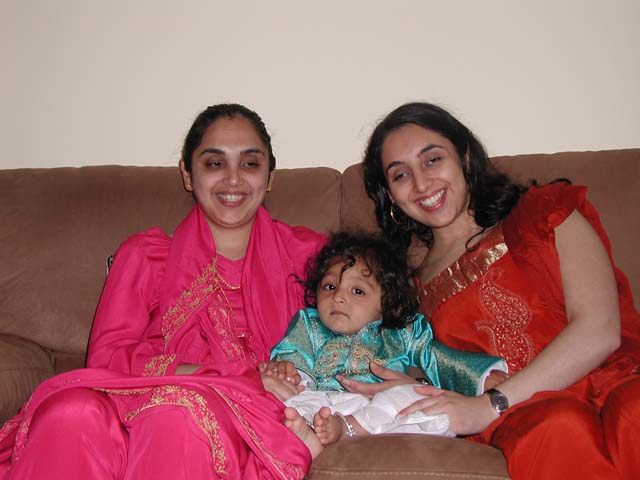
Sheena and Jasmin: SUCCESS INC
Sheena, who graduated from the Wharton School of Business and was a recipient of the Presidential Early Career Award, has a doctorate in psychology from Stanford University. She is a professor at Columbia Business School and has taught special courses to MBAs, Executive MBAs, and Executives, including at the World Economics Forum in Geneva, Switzerland. In 2005, her course on Leadership earned her an Innovation in the Teaching Curriculum award from Columbia Business School.
She has a best selling book out, ‘The Art of Choosing’ and this was shortlistd for the Financial Times Business Book of the Year award. I see her name is now Sheena Iyengar and she is married and is also a mother! There’s a heartwarming love story in there. Whereas her conservative Sikh parents had a traditional arranged marriage, Sheena met her husband, Garud Iyengar, in a more unconventional way – at a bus stop!
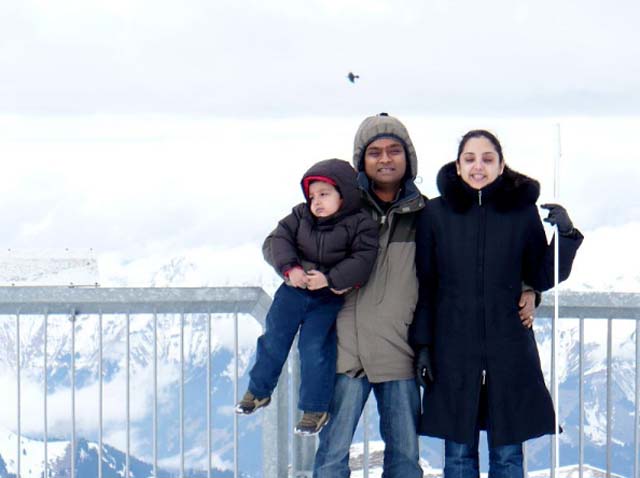
“We were both Ph.D students at Stanford University, and we were taking the bus and we chatted and then he got off at his stop and I got off at mine,” she recalls.
Some time later she advertised for a reader and he called her. This led to lunch and to friendship and four years later to marriage. Did he ever become her reader? She laughs, “No, oh he is a terrible reader! He has gotten better over the years. He doesn’t read quickly enough.” Garud Iyengar is a professor in the engineering faculty at Columbia University and the couple has a six year old son Ishaan.
The Art of Choosing
From the ambiguity of not knowing what the future would hold to the settled successful present, it has been a tough climb, one always dependent upon personal choices, made or not made, of the forks in the road and the pathways followed.
“I think the question of who should choose and how important is personal freedom became the natural question that I asked at home and at school,” says Sheena. “You know you are constantly trying to figure out where the boundaries are?”
Growing up as a child of Indian immigrants, she was being constantly given a double message. In school, children were told that you can be and do whatever it is you want to be as long as you put your mind and heart to it.
“At the same time, there were all these questions being asked, ‘Well what can she do, can she go to normal school, will she have to go to a special school, can she walk to school by herself, what can she study?’ she says. “These questions meant choice had limitations and one had to learn to balance choice in terms of its limitations as well as in terms of its possibilities.”
One would have thought that her narrowed world would have left her few choices and life would follow a predictable path. But Sheena chose instead to go off on a limb.
So how did all this start? She says the choices were so few that when she found something that fit, she ran with it. Sheena had no role models to follow as she reinvented her life and carved out her own career in a world of sighted people – as a researcher.
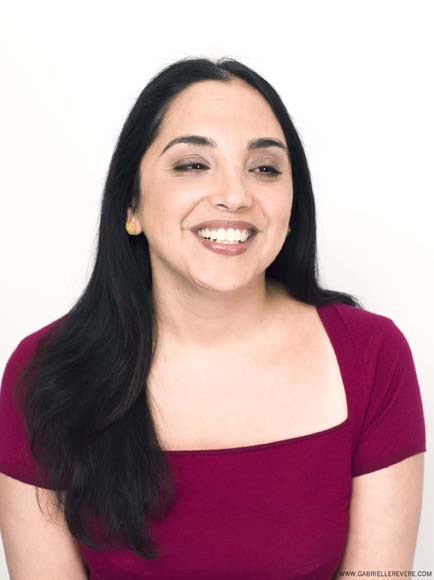
Sheena Iyengar – The Road Less Traveled
When she was growing up, she had all sorts of ideas – but none of them very practical. “You know when I was young I wanted to be a pilot, that seemed really cool, and then when I went to undergrad I thought it would be really cool if I could become some kind of an international person, I don’t know what that really meant, maybe a foreign minister, maybe the CEO in sort an international company of some kind.”
She had no role models to follow as she reinvented her life and carved out her own career in a world of sighted people. As an undergraduate, Sheena studied Spanish and went to study abroad in 1989, backpacking through Europe, sometimes with friends, sometimes alone. That year taught her so much about different cultures and why different cultures think differently.
She also traveled to Germany in the year the Berlin Wall fell. “That is when I got really interested in this idea of freedom I suppose, because here you had a totally different way of life that we were amongst the first to go in the East Berlin and see what it was like there as compared to the way it was in West Berlin.I would say that was actually the start of my interest in culture.”
At graduate school at Stanford, she studied with Hazel Markus and Shinobu Kitayama, who wrote ‘Culture and the Self’. Sheena went on to study Japanese cultural history and the language, and went to Japan to study with Kitayama at Tokyo University.
She took a class in social psychology with John Sabini at Stanford and was fascinated by all the different experiments to uncover different secrets about what affected human behavior. “No one had said that a blind person couldn’t become an experimenter,” she recalls. Sabini gave her the job – and the rest is history.
Sheena’s typical day involves meetings with students and collaborators, doing research projects and teaching courses on globalization. She is also the Research Director for the Chazen Institute, so it’s a full day. Now with the book out, there have been book tours and interviews. At home, she has the assistance of a housekeeper, but she and her husband do a lot of the cooking.
Jasmin Sethi’s Journey
While Sheena had to carve out her own path, without any role models, for Jasmin it was somewhat easier because she had Sheena’s accomplishments to assess what was possible. Her sister has been a vital role model for her. Quite brilliant from the start, Jasmin set off on an amazing career trajectory of her own. She received her BA, magna cum laude, from Harvard University in applied mathematics and economics.
A Fulbright Scholar to England, Jasmin received an MSC in economics from the London School of Economics. At Harvard University, Jasmin was an academic advisor and non-resident tutor, served on the Political Economy Lecture Series Committee and on the Harvard Graduate Council. In fact much of her student life has revolved around Harvard.
She’s also worked as a research assistant at the Kennedy School of Government, the President’s Council of Economic Advisers, the National Economic Research Associates, and the Congressional Budget Office in Washington, DC
If all that is not impressive enough, she went on to the London School of Economics on a Fulbright Scholarship, pursued her PhD in economics and her law degree at Harvard University simultaneously. She then clerked for the Honorable Jerome A. Holmes, U.S. Court of Appeals for the Tenth Circuit before becoming an associate in the litigation practice of the Washington law firm Mayer Brown.
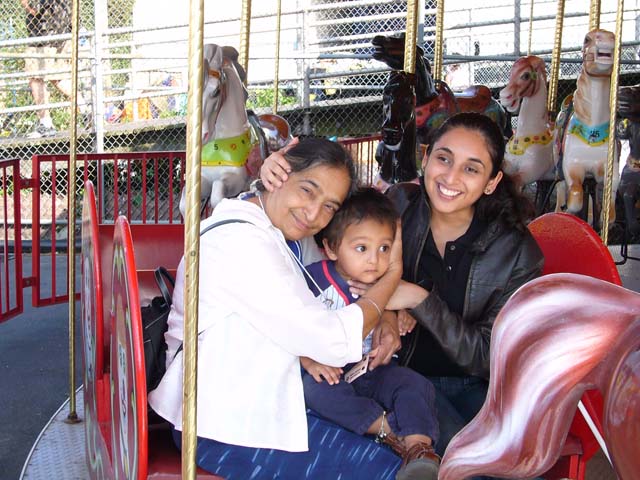
Jasmin studied economics and mathematics which is quite uncommon for blind students, and hence she was really stepping into untried ground, and had to be assertive about getting the accommodations that she needed. Having spent almost her entire student life at Harvard, she helped create a program in which blind students could work closely with teaching assistants. Over the years she seems to have become a role model for others who are physically challenged and she gets email asking her for advice.
Never one to shy away from challenges, she has gone boldly to places which were not the easiest for the blind to get around – such as Oklahoma, which has no public transport – simply because she felt it would further her career, working for a federal judge in Oklahoma City. As a lawyer in DC, she thrived on economics-oriented anti-trust cases. Since January 2011, she has worked as an attorney at the Securities and Exchange Commission in the division of trading and markets, a job she enjoys very much.
Sighted and Disabled: An Interconnected World
Both Sheena and Jasmin understand the importance of an interconnected world, dependent as they are on research assistants and human readers but they also swear by the new technology which has opened new doors for them. JAWS, which is a speech synthesizer, can convert into audio all the text on the computer as well as emails received. They also read audio books on their I-Pods; entire newspapers and books can now be read on the computer or on the phone. For the more difficult things like graphs and tables, human readers are useful.
While technology has made accessing information easier, in some ways it has become harder. “I think technology does always get more advanced, faster than we can catch up, so you are always at a bit of a disadvantage and people’s reliance on technology is much higher.” says Sheena. “So in that sense it can be a disadvantage. You know I cannot use an iPhone, I cannot use a BlackBerry and those are disadvantages. So I do need humans in the sense that I have to constantly call in when I am abroad and check with my assistant who has to read me my emails over the phone.”
Since Jasmin has a lot of reading and research to do as a lawyer, she uses a full-time reader. She then analyzes, edits and rearranges the material in her mind, creating a mental picture of where she wants to start and where she wants to go, and can listen to editing and rearranging.
Ask Jasmin how much she thinks the attitude of sighted people has changed toward the blind in the past decade, and she says, “It’s hard to separate how much I’ve changed versus how much the environment is changed. I’ve seen more blind people pursuing advanced careers, including Indian blind. There is a sense where people do feel there’s more opportunity for people with disabilities.”
Over the years, she says, she’s become more comfortable with how she does things and in recognizing what she can and can’t do. She says, “The key thing is being confident myself and acting like this is not a big deal, it’s just a little different. You sometimes have to pretend to be more confident than you are, and hope it will work out. You have to come up with your way of doing it and try it out.” As she points out, even sighted people fail sometimes, so that fear should not be there.
Living in an apartment in the suburbs of DC, Jasmin commutes to work by public transport, and leads a life like other young, independent professionals.
Ask Sheena about the attitudes in the Indian community toward the disabled, and she agrees there seems to be a lot of shame in the community and impairments are hidden to put a good face in society. By including the disabled in every-day life, she feels, the message you send out is that people who have differences can make it, and by hiding people with impairments, nobody learns anything.
“It is not actually something that people have to be as ashamed of as I think they have been,” she says. “Indian parents worry so much about the loss of face, they underestimate the Indian ability to adjust and adapt and to be kind.”
Which brings us to Sheena Iyengar’s book ‘The Art of choosing’: “One could even argue that we have a duty to create and pass on stories about choice because once a person knows such stories they can’t be taken away from him,” she writes. “He may lose his possessions, his home, his loved ones, but if he holds on to a story about choice, he retains his ability to practice choice.”
It was indeed an active choice that the sisters made to play the hand that life had dealt them and play it with boldness and faith in themselves. In a narrow world of few choices, they both decided to leave the shore and plunge into the unknown, using education as their magic password.
( Update: Jasmin Sethi was Special Counsel in the Office of Market Supervision within the Division of Trading and Markets at the U.S. Securities and Exchange Commission. She joined the SEC in 2011. She has also served as an Adjunct Professor at Georgetown Law School. Since 2014, she has been Vice President at BlackRock. More details at http://www.jasminsethi.com/. She is currently the CEO and Founder of Sethi Clarity Advisers, a New York City based. boutique consulting firm providing regulatory advice to Morningstar, amongst others. She serves as Associate Director of Policy Research at Morningstar.)
© Lavina Melwani
(This article first appeared in Khabar)
What do you think? Share your thoughts on this and other inspiring people you know about! Add your input in the comments section. Thanks!
Related Articles:
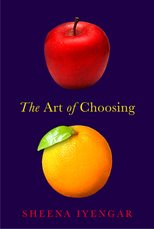

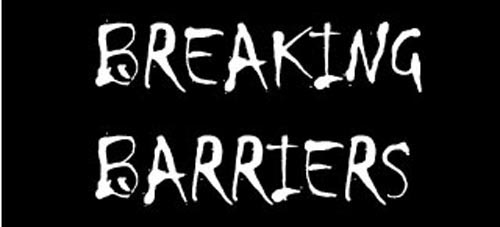
31 Comments
Pingback: Columbia alum files gender discrimination lawsuit against renowned professor - Student News Today
Pingback: Columbia alum files gender discrimination lawsuit against renowned professor - Dallas Press News
I’ve been following the story of these amazing sisters for a long time through Indian-American publications. I vividly remember reading Lavina’s story, ‘Breaking Barriers’ in Khabar a while ago that gave total insight into the lives and accomplishments of Sheena and Jasmin. With their sheer hard work, they have accomplished so much that their story is not just inspirational to visually challenged but to everyone.
These sisters are extremely beautiful, both inside and outside. What amazed me in Lavina’s story is that neither Sheena nor Jasmin never complained of anything and didn’t show any negativity but were only positive about their lives.
Sheena and Jasmin epitomize the hope for everyone in this world which is scary at times. Thank you Lavina, for bringing out this inspirational story, once again, to the attention of the world.
Saurabh Agnihotri via Facebook
Sheena is my class mate’s wife …. he is also a Prof at Columbia
Rachna Daryanani via Facebook
Wow! Impressive! Thank you for sharing such a heartwarming story.
On Facebook
Tanmaya Kumar Nanda, Lalita Viswanathan, Maneet Chauhan and 56 others like this.
It is so enriching emotionally and morally.The story gives a message to everyone..I as a woman and as a parent got inspired. Would really want to read about their parents and the exceptional upbringing they did…
Mili Mehta via Facebook
Wow!
Narender G. Reddy via Facebook
These Sisters are the true Heroes and inspirational to one and all.
Deeply inspiring and humbling – would love to get more insights into the role of the parents, in building the confidence and providing the exploratory freedom required for Sheena and Jasmin to blossom. Hats off !
Hi Lavina,
Wonderful, inspiring article – thanks for posting it!
We need to be made aware through both the sisters that our life has endless capabilities as long as we have the determination to achieve our aims and be positive in every step of our life.
Hamsa, thanks for your comment. I think many will agree with you!
Simmmat Bindra, sorry missed responding to your comment. You’re right – their lives put it into perspective for those of us who lose heart even with the small challenges.
Truly inspirational. Hats off to the sisters.
Simmrat Bindra via Facebook
At times life leaves me de-motivated.. Irritated n just then an inspirational story comes in front of me … Hats off to the sisters… They set a perfect example “If you want to, then you will “
Deepa Prasad, thank you for your comment. They are indeed both remarkable women, and I’ll keep you posted when there are new articles about their work.
Vineeta, my best to your husband. We never hear of these quiet unsung heroes who fight their battles every day. I’m sure there must be many support groups in the US and perhaps you could try linking with them or forming Indian chapters? That way, perhaps, many positive aspects could be implemented in India too?
Hi Surekha, I agree they are both remarkable and determined and the US certainly offers the nurturing and encouraging environment that is needed. I wish people with disabilities in India had even a few of these opportunities.
Kudos to Sheena, Jasmin, their parents, and the society they live in. My husband has Retinitis Pigmentosa, and I know how challenging each day is for him! He inspires and impresses me every day by the way he chooses to live his life, but whenever we visit the U.S. it is as if has found wings. They make it so much easier for people with disabilities to function. I know that my husband had tried to get Sheena to come to India for a Business Today event. Unfortunately that did not work out. My very best to Sheena, Jasmin, and their families.
These two young ladies are awe-inspiring! I do agree that all that they have achieved is because of opportunities afforded them due to their living
here in US ( which I am sad to say wouldn’t happen if they were living in India), but they certainly are blessed with brilliant minds! God bless them!
It simply is a very, very beautiful article, I know both of them, since Sheena Bhabi is truly a role model for us…..and met Jasmin for Bhabi’s wedding. please mail me if there are few more articles.
Sabu, thanks for your comments. I will post the earlier stories too.
Thanks Anela – I will put them on soon and will email you when I do.
An excellent article on these two extraordinary women!! I would be very interested to read your earlier articles on their lives, which you referred to, as well. Would you please send me a note when you have posted them? Thank you! ♥
I personally know the Iyengar family (Dr Iyengar, Leela Iyengar, Garud and Raghu); Leela Iyengar will recall me as I had worked under her supervision. Also I met Sheena in IIT Kanpur during her first visit after her wedding to Garud. I remember all of you, God will bless you all.
Also Lavina, i enjoyed the article, well done.
Adam, so glad you enjoyed the article. I had followed their story from the time Jasmin graduated from high school. You might enjoy reading those earlier articles and I will post them soon. They are truly inspirational.
Hi Rimly – these are indeed incredible girls! I have known them since Jasmin was in high school – and their triumphs are quite mind-boggling.
Thanks Leena for your comment. It’s true – American society is so interactive and there are so many resources for the disabled. There is not only compassion but the belief that everyone has a right to live to their full potential.
Lavina, I always enjoy reading your articles. Beautifully written, very inspiring – I am simply stunned and have no words…Sheena and Jasmin, you are blessed…congratulations to you and your family. With my very best, Adam
That was so inspiring. They are incredible girls who have pushed their boundaries to be where they are today. Just goes to show nothing is impossible if you have the will. All the best to both the extraordinary girls.
What a wonderful article to read – both women are so inspiring. It really makes me appreciate how open-minded American society still is and the resources available to people with disabilities. Best wishes to both Jasmin and Sheena!